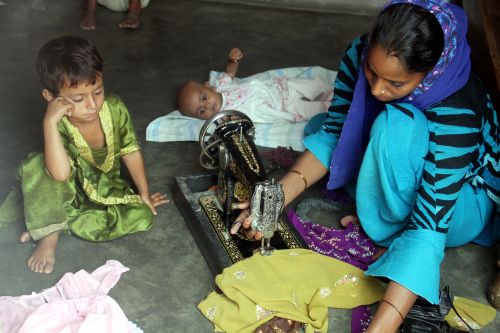By Zofeen Ebrahim
RIO DE JANEIRO, Jun 21 (TerraViva) What does birth control have to do with reducing global emissions? Everything, women around the world would say, because they know how closely linked reproductive health is to poverty, food security, climate change and more.

A woman’s work is never done. Taken in a low-income settlement in Karachi, Pakistan. Photo by Fahim Siddiqi/IPS
This message was precisely what female leaders at the Rio+20 Conference on Sustainable Development were saying, but not many were listening, least of all the Vatican.
“The only way to respond to increasing human numbers and dwindling resources is through the empowerment of women,” said Dr. Gro Harlem Brundtland, former prime minister of Norway and former director-general of the World Health Organisation (WHO).
“It is through giving women access to education, knowledge, to paid income, independence and of course access to reproductive health services, reproductive rights, access to family planning,” she stressed.
Female leaders have long been telling the world that sustainable development is not just about deforestation, climate change and carbon emissions. It’s about understanding that sustainable development will not be possible without gender equality and that sexual and reproductive rights are human rights.
This concept is nothing new. At the Rio Earth Summit in 1992, there was unanimous agreement that sustainable development cannot be realised without gender equality.
So it’s frustrating for people like Rebecca Lefton, a policy analyst focusing on international climate change and women at the Center for American Progress, a Washington D.C.-based think tank, to be fighting over something that was recognised 20 years ago.
Lefton has followed the negotiations for several months, and to her dismay, has found that many references to women’s reproductive rights and gender equality have been scrapped from the Rio summit’s text.
“Women’s rights and gender equality were affirmed, but not as strongly as they could be,” she told TerraViva. “I don’t think the text would be reopened to be revised or tweaked,” she added.
Brundtland sounded more optimistic. “It looked quite bad some weeks ago in the preparing process for this meeting….In the last week or two this has improved,” she said, citing “key passages on women as central partners in decision-making”.
The United States, Norway and several women’s rights organisations were fighting to keep the language strong, but the Holy See (the Vatican) led the opposition to remove passages ensuring women’s reproductive rights.
“The result is that the final text has no reference to reproductive rights and commits to promotion rather than ensuring equal access of women to health care, education, basic services and economic opportunities,” said Lefton.
“It’s quite frustrating to find the Vatican exerting so much power over what the majority of women want but don’t have access to,” she told TerraViva, adding that the Vatican equates reproductive rights and health with abortion – an inaccurate comparison, at best.
Female heads of state and government gathered at the Rio+20 women leaders’ summit nevertheless remained undaunted and pledged that the document they signed would not be lost in the “forest of declarations on gender issues”. They urged governments, civil society and the private sector to prioritise gender equality and female empowerment in their sustainable development efforts.
“We know from research that advancing gender equality is not just good for women, it is good for all of us. When women enjoy equal rights and opportunities, poverty, hunger and poor health decline and economic growth rises,” said Michelle Bachelet, executive director of U.N. Women.
Cate Owren, executive director of the Women’s Environment and Development Organisation (WEDO), criticised the removal of references to reproductive rights from the Rio outcome document.
“Political compromises for the sake of an agreement should not have cost us our rights – nor our planet,” she said.







 Add to Google
Add to Google







